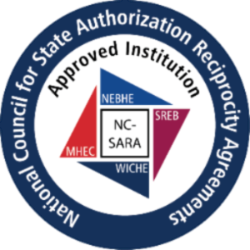Compliance and Ethics
Distance Education Authorization
Page Content
DISTANCE EDUCATION AUTHORIZATION
State authorization represents a means of obtaining state approval to conduct regulated activities (i.e. providing distance education such as online learning, supervised field experiences, as well as engaging in marketing, advertising, hiring out-of-state faculty, etc.).
An institution cannot legally engage in regulated activities in a state without being authorized directly by the state or through a reciprocity agreement if the state is a member of such an agreement.
For more information about state authorization, see the WCET-SAN article.
The National Council of State Authorization Reciprocity Agreements also known as NC-SARA or SARA is a reciprocity agreement among member states, districts, and territories that establish comparable national standards for interstate offering of postsecondary distance education courses and programs. It is intended to make it easier for students to take online courses offered by postsecondary institutions based in another state and offers participating institution in member states the ability to offer distance education in said states.
SARA is overseen by a National Council and administered by four regional education compacts. 49 of the 50 states are members of NC-SARA. As of Fall, 2022, California is not a member; but California does not have a body tasked with regulation of distance education of public or private non-profit institutions.
For additional information about authorization, see the SARA-page.
USM participates in NC-SARA to allow us to engage in regulated activities within the parameters set forth by NC-SARA as listed in the NC-SARA manual.
Data Reporting
Annually, we must collect and report data on:
- the total number of distance students in our programs broken down by state in which
said students are located that are:
- Online students; and
- Students engaged in supervised field experiences (including clinicals and internships) outside of the state of Mississippi.
Professional Licensure Disclosure
We must disclose to our distance students whether or not their program of study will lead to professional licensure in the state they are located or in the state in which they indicate to us that they plan to work upon graduation.
For additional information about professional licensure, click the button below:
All University of Southern Mississippi distance education students should attempt to resolve complaints first with the university before contacting outside agencies for resolution.
If the complaint cannot be resolved at the institutional level, the student can contact the NC-SARA portal agent (in every state but California, which is not a member state participating in NC-SARA).
For information on the MS NC-SARA Portal agent, view the MS NC-SARA page or the MS SARA page.
The student can file a complaint using the link below
DISTANCE EDUCATION STUDENT COMPLAINT FORM
For additional information about the NC-SARA complaint process, view the NC-SARA Student Complaint Page.
If the distance education student resides in California, they will need to contact the California Department of Consumer Affairs, as USM is a public non-profit institution. The department's website lists their contact information and contains a link to the print and online versions of complaint forms.
The number of students exclusively enrolled in online programs and the number of students in out-of-state supervised field experiences including those experiences which must be reported to the state licensing board before they can take place.
Supervised field experiences include "student learning experiences under the oversight of a supervisor, mentor, faculty member, or other qualified professional, located in the host state, who has a direct or indirect reporting responsibility to the institution where the students is enrolled" regardless of if credit is granted. Examples include "practica, student teaching, or internships".
